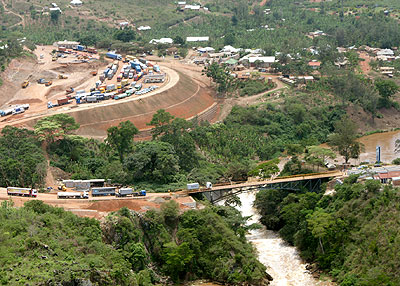Rusumo power project, a joint undertaking by Burundi, Rwanda and Tanzania, is due for implementation effective 2015.


Rusumo power project, a joint undertaking by Burundi, Rwanda and Tanzania, is due for implementation effective 2015.This was disclosed during a tour by water and energy ministers from Burundi, Rwanda and South Sudan of Rusumo water falls in Kirehe District on Sunday.While addressing the media after the tour, South Sudan’s Minister for Electricity, Dams, Irrigation and Water Resources, Jemma Nunu Kumba, said that the project presented a major milestone in Trans-boundary cooperation in the Nile Basin and is a significant achievement for the three countries."This is a long term project that is being realised today...there is no doubt it will benefit the peoples of the three nations,” she said. Kumba further clarified that countries that were initially against the use of the River Nile waters were now ready for the project implementation."Our common objective is to manage the resource in a sustainable manner for the benefit of the people living within the Nile Basin.”Maximising accruing benefits Rwanda’s Natural Resources minister Stanslas Kamanzi said that the $470 million project would generate 80MW of renewable hydroelectric power, to boost the badly needed, reliable power supply in the three countries."Our people should be ready to maximise the accruing benefits of this project including jobs, supply of goods, etc to increase the project’s benefits,” he said.The Rusumo hydroelectric power project is expected to provide electricity access to people in the three East African countries of Rwanda, Burundi, and Tanzania. The project is jointly funded by the World Bank, African Development Bank (AfDB) and other development partners. The World Bank is financing the project to the tune of US$340 million – US$113.30 million to each of the three governments.It is the first operation under the World Bank Group Great Lakes Regional Initiative inaugurated by the World Bank Group President Jim Yong Kim during his joint visit with UN Secretary General Ban Ki-moon in May 2013. The project, once completed, is expected to reduce electricity costs, promote renewable power, spur job-led economic development, and pave the way for more dynamic regional cooperation, peace and stability among the countries of the Nile Equatorial Lakes (NEL) sub-region in East Africa. Compensation for over 600 households that will be affected by the construction from Tanzania and Rwanda is underway.


